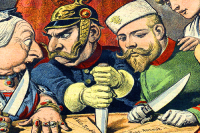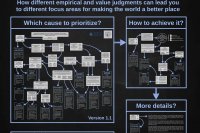Words are the building blocks of the world. Words are powerful beyond measure.
This is why Fascist regimes burn books and why corporations pollute mass media with subliminal promotions of popular ideology.
Words make us who we are, and if you aren’t conscientious of how words are directing your life, you’re likely a slave to someone else’s agenda.
Here are 5 words you’d be wise to tattoo upon your very soul:
Effective communicators run the world.
Become one, or risk sacrificing your potential influence.

Photo Credit:lilivanili (Creative Commons)
The Age of Information
We live in the age of information, where an incomprehensibly vast amount of language and information is constantly produced and dispensed.
Organizations of all kinds, from governments to universities to corporations, are reaching out to more people than ever before, through the power of the social web.
Furthermore, organizations have become heavily reliant on dynamic teams. In our rapidly changing world, teams of people with drive and insight are forging the path into an uncertain future.
The world of mankind has always been fundamentally collaborative and interactive, but what has occurred in modern times is a revolution in our means of communication.
Never before could billions of people be reached at a moment’s notice. Never before could virtually anyone communicate with almost anyone else. Never before have messages been dispersed with such density and frequency.
The world has gotten quite a bit noisier, and this shift has resulted in a huge opportunity for those who deserve to be heard and know how to earn attention.
The Opportunity
At the same time, Generation Y is struggling to hold a conversation (at least one that doesn’t involve texting). Television, computers, phones, iPods, and other gizmos have distanced us from meaningful in-person communication.
This situation manifests an enormous opportunity for real communicators — people with interpersonal savvy, adaptability, and a knack for experimenting with different approaches.
If you have the ability to clearly state a message in a tasty and convincing way to a particular group of people, you can become an indispensable leader in the modern age.
People with extraordinary communications skills are the movers and shakers of our society.
From innovative entrepreneurs and Congressman, to journalists and CEOs, to artists and religious leaders, the rule holds true — the people who make their presence felt by many are those who can communicate best. Communicators win.
And guess what?
It’s always been this way, but never has there been so much opportunity for almost anyone to leverage the awesome power of communication.
You can win too. You can leverage this knowledge and thrive, by not underestimating the importance of communication and by actively cultivating extraordinary communications skills.
Defining Extraordinary Communication
It might be useful to define what I mean by extraordinary communication. I don’t mean chatting with grandpa Joe or even the ability to craft a nice-sounding sentence.
I define communication as the delivery of honest, relevant, targeted, anticipated, insightful messages to the proper audience. Let’s unpack that quickly.
Honest – Communicators gain influence by telling the truth. Beyond that, great communicators often see the truth before most people. Discernment and insight are key. The best communicators are visionaries.
Relevant – To whatever audience a message is being delivered, whether it be your boss, co-worker, Twitter following, or church group, the message will not resonate if it isn’t suited to that audience’s interests.
Targeted – People respond most notably to communicators who “speak their language”. That is, they respond to those who incorporate a vocabulary, tone, subject matter, and personality into their message that makes the receiver feel included and at ease.
Anticipated – The best message you can deliver is the one that your audience feels as if they were waiting to hear.
Insightful – I touched on this in the definition of honesty, but it’s worth repeating. Indispensable communicators have ideas worth articulating.
Ideas are a type of currency, and great ideas are derived from discernment, an acute understanding of the underlying machinery of the world, knowledge of how history has unfolded, and a vision of where we should be directing ourselves as we progress into the future.
Becoming an Extraordinary Communicator
I hope I’ve convinced you of the importance of remarkable communicators, but how can you become one? It isn’t as difficult as you might think. If you follow these suggestions, you’ll amaze yourself.
1. Accept chances to speak publicly.
Speaking publicly improves your ability to clearly articulate a message and gives you confidence that you have ideas worthy of people’s attention. Almost everyone will have to speak publicly in their life, but most people are afraid of being in front of others and do what they can to avoid it.
Let their fear be your opportunity. We all fear being in front of a room full of piercing eyes, but the more you do it, the more comfortable you become. I’ve found that a helpful technique is to imagine that everyone in the room is on your side, wanting you to do well (And in most cases, they are).
2. Read widely.
Take the reigns of your education and read what you’re curious about. Reading is a delightful, never-ending intellectual journey and results in the discovery of new areas of curiosity. Reading is essential to gaining the understanding and insight necessary for extraordinary communication.
3. Use correct spelling, grammar, punctuation, etc. all the time.
This is a useful habit that everyone should cultivate. U smply dont exood credabilitee or cummand respekt when u rite lyk dis. Obeying language conventions demonstrates expertise and makes your message easily comprehensible.
4. Proofread.
Re-reading, editing, and re-writing written work is imperative to honing in on areas for improvement in your writing and in your thinking processes. Have others assist you. If you attend a university, stop in to the writing center. I work as a consultant at my university’s writing center, and it’s a wonderful space for learning and discussion.
5. Have meaningful conversations.
It’s much easier to become a brilliant communicator if you ditch the small talk and start having more meaningful conversations. While most people spend their time chit-chatting about recent happenings or other people, you should be deliberate in directing conversation toward ideas or educational topics of mutual interest.
6. Notice how your words affect people.
Your vocal chords have enormous potential to do harm or good. Pay close attention to how people respond to your words. Notice what tends to make people comfortable and what kind of tone and type of presentation allows what you’re saying to resonate most deeply with them.
Also notice what types of approaches tend to turn people off. Ask yourself, when someone won’t listen to you or discredits what you’re saying, how presenting the information in a different way could have produced better results. Constant refinement of communication technique is key.
7. Tweak and adjust messages.
This goes along with constant refinement. As you’re being attentive to how words affect people, experiment with new ways of speaking and explaining. Observe firsthand what subtle moves can completely alter the quality of an interaction.
8. Make eye contact.
This is a no-brainer, but people are bad at it. Looking someone in the eye (at least in American culture) is a sign of confidence and respect.
9. Listen carefully.
Listen all the time, and listen to learn. Reading is a type of listening. Overhearing conversations is a type of listening. When you’re listening to someone you’re talking to in-person, nod your head. People like to know you’re paying attention. Listening carefully and with an open mind is crucial to thoughtful communication.
10. Don’t fear saying what you feel and making mistakes.
Learning to communicate effectively is learning how to be comfortable with who you are. So, unless it’s malicious or potentially hurtful, say what you think and feel and forgive the people who are afraid of you because they could never do it.
A good rule of thumb to determine whether or not something should be said is this: Ask yourself, “Is it kind? Is it true? Is it necessary?”.
11. Put yourself in others’ shoes.
This goes along with keeping an open mind. You must empathize with and respect your fellow man to learn from him. Value the people around you and their ideas, and before you would spite them or condemn them, try to imagine how it is to live their life and what factors have shaped their behavior.
12. Teach.
Helping others to learn and understand is a great test of your own understanding. Trying to educate someone reveals to you the holes in your own knowledge. It also prompts you to consider communication at a more strategic level.
13. Acknowledge your unique voice and ideas.
You become much more concerned with how you communicate when you realize the value of your message. You have a unique perspective and personality that you can share with others to benefit them and the world. When you realize this, you begin to grasp the indispensability of skillful, thoughtful interaction with the world.
14. Face the truth, even if it isn’t pretty.
Pure, beautiful communication conveys the truth, and sometimes it can be unsettling to peer out at the world and see it for what it is. It can be a burden to see the hypocrisy, suffering, and self-interest that is all around us.
But you must. You must settle for nothing less than understanding. Facing the beautiful and the horrible aspects of life is pivotal, not just for communicators, but for anyone seeking true satisfaction. You’ll know you’re on the right track when you begin to feel compassion for those you haven’t met, when you want to fight the evils of the world and contribute to the solution.
You’re on the Right Track
If you’ve made it this far, you’ve probably, on some level, agreed with my central premise: That communication skills have always been important and are now valuable beyond measure.
Whatever your direction in life, you’ll find that you can navigate this existence much more effortlessly by becoming a communication extraordinaire.
Simply acknowledging this fact and becoming conscientious of how you interact with the world is a monumental first step.
So pat yourself on the back, and remember to continue transforming yourself into the righteous, rainbow-hued bell tower of lovely word wizardry that you are capable of becoming.
“Words are, of course, the most powerful drug used by mankind.”
―Rudyard Kipling
Best of luck.
Regards,
Jordan
P.S. Subscribing for free e-mail updates isn’t as painful as it sounds. In fact, it can be quite exciting to receive a neatly packaged parcel of teachings each week, conveniently sent straight to your inbox. Just sayin’. Think about it.
What more do you have to say about communication? Leave a comment below, dammit. I’m so thirsty for a conversation.
About Jordan Bates
Jordan Bates is a Lover of God, healer, mentor of leaders, writer, and music maker. The best way to keep up with his work is to join nearly 7,000 people who read his Substack newsletter.




Nice work, Jordan! There are lots of really great thoughts here. Also, your website looks spot-on. I’ll be reading more whenever you post it =)
Hey Michael! Thanks so much for checking out my site. I’m glad you like what you see, and I’m even happier that you found my post to be thoughtful. I see you’ve gotten a new web design since the last time I checked out your blog. I dig the new look. Glad to hear you’ll be sticking around. Welcome. 🙂
“U smply dont exood credabilitee or cummand respekt when u rite lyk dis.” What I think is funny and interesting about this moment in your post is the degree to which I do understand what you are saying here and saying it in this way is precisely about gaining credibility. So…maybe there’s something more nuanced to be said here: choose when and where and for what purposes you write in ways that violate your readers’ expectations for correctness. Make your choices (and the fact that you are making choices both grammatically and rhetorically) clear as you write and speak.
Frankie,
Thanks for the comment! I think you make a great point, and I hadn’t thought about it in that way. If your audience acknowledges your agency and assumes your choices are deliberate, then violating standards of correctness can become an effective rhetorical strategy.